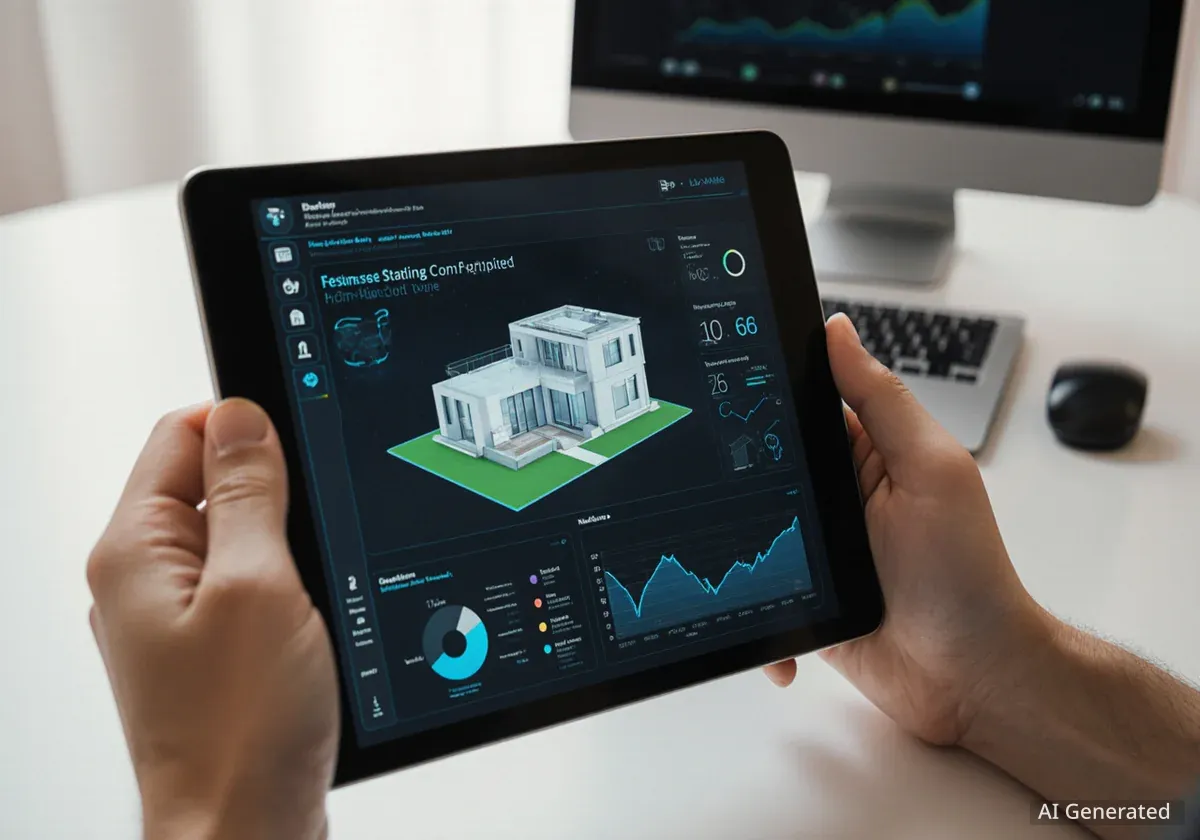The global market for real estate software is on a significant growth path, projected to more than double in size over the next seven years. A new market analysis estimates the industry's value will climb from USD 13.65 billion in 2025 to USD 34.1 billion by 2032, driven by a strong compound annual growth rate (CAGR) of 14.0%.
This expansion is largely fueled by the real estate sector's increasing adoption of digital tools and cloud-based technologies. Companies are actively investing in software solutions to streamline operations, reduce manual tasks, and improve service for clients and tenants.
Key Takeaways
- The global real estate software market is expected to grow at a 14% CAGR between 2025 and 2032.
- The market valuation is forecast to increase from USD 13.65 billion in 2025 to USD 34.1 billion by 2032.
- The commercial real estate sector is projected to be the largest user, accounting for an estimated 63% of the market share in 2025.
- North America is expected to lead the market, holding over one-third of the global share in 2025.
- The Asia Pacific region is identified as the fastest-growing market, with a projected share of 22.9% in 2025.
Digital Transformation Drives Market Expansion
The primary force behind the growth in real estate software is the industry-wide shift toward digitalization. Real estate firms are moving away from traditional, paper-based systems to more efficient, automated digital workflows. This transition helps companies reduce operational costs, improve accuracy, and gain a competitive edge.
This trend is visible globally, with significant digital adoption in countries like the United States, China, and India. For example, the Indian government has been actively digitizing land records. According to the Ministry of Rural Development, 95% of rural land records in India have been digitized since 2016, creating a foundation for software-based management.
The Shift to Automation
Real estate professionals, including property managers, agents, and developers, are increasingly using software to automate repetitive tasks. This includes rent collection, maintenance requests, accounting, and lead management. Automation not only saves time but also reduces the potential for human error, allowing staff to focus on more strategic activities like client relations and business growth.
As the real estate industry continues to modernize, the demand for sophisticated software solutions that can handle complex operations is expected to rise steadily throughout the forecast period.
Key Market Segments and Regional Dominance
The real estate software market is composed of several key segments, each addressing specific needs within the industry. The software is categorized into types such as Enterprise Resource Planning (ERP), Property Management Software (PMS), and Customer Relationship Management (CRM).
Software Types and Applications
Among the different software types, Property Management Software (PMS) is expected to be the most sought-after solution. PMS platforms help landlords and property managers handle daily operations, including tenant communication, lease tracking, and financial reporting, making them essential for efficient property oversight.
When looking at applications, the market is divided into the residential and commercial sectors. The commercial sector is slated to be the dominant force, projected to hold approximately 63% of the global market share in 2025. This is driven by the complex management needs of office buildings, retail centers, and industrial properties.
Regional Market Outlook
- North America: Projected to dominate the global market with over 33% share in 2025, driven by high technology adoption rates.
- Asia Pacific: Expected to be the most lucrative and fastest-growing region, with a 22.9% market share in 2025, fueled by rapid urbanization and infrastructure development.
- Europe: A mature market with steady growth, focusing on sustainability and smart building technology integration.
Technological Innovations Shaping the Future
A significant trend within the real estate software market is the integration of advanced technologies like Artificial Intelligence (AI), the Internet of Things (IoT), and data analytics. Software vendors are increasingly embedding these features into their platforms to offer more powerful tools.
AI-driven features can provide predictive maintenance alerts for properties, personalized property recommendations for buyers, and streamlined transaction processes. For instance, companies like Zillow use AI algorithms to enhance the user experience and simplify the home-buying journey.
"The global real estate software industry is projected to grow rapidly, owing to expanding real estate sector, rising adoption of digital solutions, growing popularity of cloud-based solutions, and increasing demand for automated property management and AI-driven decision-making tools."
Cloud-based software platforms are also gaining significant traction. Their popularity stems from lower upfront costs, scalability, and the ability to access data remotely, which is particularly beneficial for property managers overseeing multiple locations. This accessibility has made advanced software more attainable for small and medium-sized businesses.
Challenges and Opportunities in the Market
Despite the positive growth outlook, the real estate software market faces certain challenges. The high initial investment required for some comprehensive software platforms can be a barrier for smaller property management companies and independent landlords.
Addressing Data Security Concerns
Data privacy is another major concern. Real estate software handles sensitive financial records, personal client information, and valuable property details. The risk of cybersecurity threats and data breaches can slow the adoption rate as companies weigh the benefits against potential vulnerabilities. In response, software providers are investing heavily in enhanced security measures to protect client data.
The increasing frequency of ransomware attacks targeting real estate firms has underscored the need for secure, reliable software. This has pushed many firms toward reputable cloud-based solutions that offer robust, built-in security protocols and regular updates.
Recent Industry Developments
The market continues to evolve with new product launches and innovations. Recent key developments include:
- July 2025: Measurabl launched a free sustainability software solution, giving real estate professionals tools to measure and report on their portfolio's environmental performance.
- June 2025: AppFolio introduced new AI agents in its Realm-X platform, designed to automate complex workflows and improve operational performance.
- March 2024: Planon released its Real Estate Management solution for SAP S/4HANA, offering a fully integrated platform to help organizations manage their properties and sustainability goals efficiently.
These developments highlight the industry's focus on integrating AI, sustainability, and comprehensive management features into next-generation real estate software.





